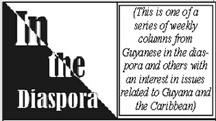By Lear Matthews
Lear Matthews is professor, State University of New York, Empire State College. A former lecturer at the University of Guyana, his recently published book is “English Speaking Caribbean  Immigrants: Transnational Identities”. He writes on Diaspora issues.
Immigrants: Transnational Identities”. He writes on Diaspora issues.
Going ‘home’
“Yuh goin’ home fuh de independence celebration?” “I would’nt miss it fuh nut’n!” “I book my flight six months ago gyrl, Ah cyan’t wait!” “Sheeluh and she whole family goin down!” “I ain’t able wid duh confusion, I gong guh laytuh in de year!” These comments characterize remarks heard among Guyanese in the Diaspora as they anxiously anticipated participating in the commemoration of the nation’s 50th independence anniversary.
Raison d’être – More than a celebration
For some the visit was merely a fleeting nostalgic moment of euphoric excitement. For others it is a significant pilgrimage to the land they love. Or it could be their last sojourn to the country of their birth because, based on observation, perception or rumor, they worry about the development prospects of the nation under ANY administration. Yet for many, the moment may represent the dawning of a new era when Guyanese will be drawn back to their homeland, physically or symbolically.
This unprecedented milestone attracted thousands of ‘home sick’ expatriates. Simultaneously, several parallel Jubilee anniversary events sponsored by hometown associations and specially formed 50th Commemoration Committees have occurred at various locations in the Diaspora. These included an array of cultural extravaganzas, Sports events, educational symposia and Flag-raising ceremonies, reflecting the nation’s historical, contemporary and future journey. One welcomed observation is that in planning the various events, Guyanese across ethnic groups and educational levels have worked collaboratively, seemingly cognizant of the importance of inclusion and cross-cultural representation for such an historic occasion – A rarely acknowledged dimension of Guyanese social relationship reminiscent of the struggles toward independence.
The opportunistic enthusiasm to return ‘home’ is testimony to the strong emotional ‘attachment’ to one’s country of origin. Perhaps more pervasive than some would admit, there is a deep-seated yearning to return to the home country, a yearning which may have been reignited by the recent change of the governing administration.
Sustained connectedness
Although visiting jubilee celebrants have been reportedly referred to by locals as “the foreigners” (a label some starkly resent), many in the Diaspora still view Guyana as ‘home’, keeping ‘in touch’ with transformations therein, through frequent visits or social media. Others may be returning for the first time or after many years, to a ‘strange land’ which they once knew as ‘home’. Decisions about the nature of sustained connectedness or commitment to contribute should be informed by a number of factors. While in Guyana, it is hoped that visitors observed keenly, not only visually, but by having conversations with local residents, young and elderly (across the ethnic/race and class spectrum) about their feelings, ideas and wishes. Such interaction should always be conducted in a non- patronizing, but validating manner.
Visitors should also travel beyond Georgetown, to other regions of the beautiful land of many waters; understanding that some aspects of the infrastructure and culture have changed drastically and are different from the ‘home’ they remember, while other aspects appear to have remained the same. The latter may either conjure up a recaptured love for country or viewed as a frustrating sign of lack of progress.
Some people view the change of administration as a good opportunity to contribute to the advancement of their country of birth. However, this phenomenon could forge their desire to return unconditionally if not impulsively, which may be a function more of sentimental connectivity than practical, rational consideration.
Diaspora vision for the nation at 50
In light of the above-mentioned attributes and perspectives, it is evident that many in the Diaspora, whether they made the commemorative pilgrimage or not, want the same things for the nation as people at home. These include: good jobs; equitable resource distribution; affordable housing; education and training for the youth; a fair and just legal system; adequate health care; programmes for the elderly; sanitary conditions in both rural and urban areas; security; crime reduction and an effective criminal justice system; clarity, fairness and accountability; and the opportunity to invest financially. While some would like to ‘go back home’, others prefer to contribute by joining home town associations and sending remittances.
After celebrating –rebirth of a nation
After the celebration, enhanced by a few drinks, nuff gyaff, soor and tantalyzin’ wid dem hometown boys; some ‘tahk name’ wid de gyrls; partying, eating wild meat and reminiscing. After the Awards and assessing the journey from ‘BG’ to ‘GT’, and pontificating about what the government ‘should’ and ‘shouldn’t’ do.
After the surprises, criticisms, disappointments, observed accomplishments and frustrations, singing of praises and giving thanks. After walking in li’l mud and getting drenched by a good Guyanese rain, let the BRIDGIN’ continue for the future of our country. Now that the celebration is over, the real work of charting a collaborative course toward continuous change and development is on. The Diaspora went ‘home’ to help raise the Golden Arrowhead once again, which hopefully signaled the ‘rebirth’ of a nation.





